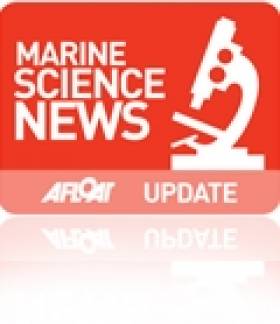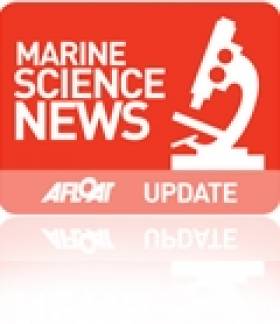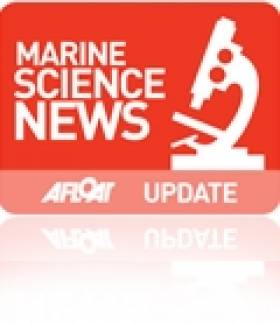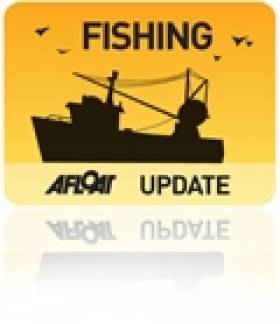Displaying items by tag: Blue Growth
Maritime Research To Get Special Attention At Horizon 2020 Programme Launch
#Horizon2020 - The national launch of Horizon 2020, the European Union’s new €80 billion programme for research and innovation to create new growth and jobs in Europe, will take place in the Dublin Convention Centre on Tuesday 10 December.
This event is free to attend, and registration is available online at the Enterprise Ireland website.
Horizon 2020 has an increased budget of nearly 30% in real terms compared with its predecessor, the Seventh Framework Programme for Research and Technological Development (FP7).
As a result of a new strategic programming approach, 12 'focus areas' have been identified for special attention. One of these, Blue Growth: Unlocking the potential of the seas and oceans, means that marine/maritime research and innovation will receive special attention in Horizon 2020.
The areas of research that will be the focus of the first calls (2014/2015) are listed online HERE.
The EU Blue Growth Strategy (2012) recognises that seas and oceans are drivers for the European economy with great potential for innovation, economic growth and job creation. The strategy is the Integrated Maritime Policy's contribution to achieving the goals of the Europe 2020 Strategy for smart, sustainable and inclusive growth.
Implementation of the Blue Growth Strategy, including sea-basin programmes such as the EU Atlantic Action Plan (2014-2020), can be supported by EU co-funding programmes such as Structural and Cohesion Funds (eg INTERREG, Smart Specialisation), Horizon 2020 and the European Maritime and Fisheries Fund (EMFF).
The Irish marine research community, including small- and medium-sized enterprises (SMEs), benefitted greatly from FP7 (2007-2013), participating in 127 competitive and collaborative marine research projects drawing down grant-aid of over €48 million, of which 42% was shared between 39 SMEs.
This level of participation equates to circa 180 new marine science jobs in Ireland, and the figure increases to 270 jobs with the inclusion of both FP7 and INTERREG-IV marine projects over the period from 2007 to 2013.
Irish successes include MARINET (Marine Renewables Infrastructure Network for Energy Technologies), led by University College Cork, and ASIMUTH (Applied simulations and integrated modelling for the understanding of Toxic and Harmful Algal blooms), led by the Bantry-based Daithi O’Murchu Marine Research Station (DOMMRS) and which won the 2013 COPERNICUS Award for the best earth-monitoring service for European citizens.
Other projects led by Ireland include: MarineTT (European Marine Research Knowledge Transfer and Up-take of Results), led by AquaTT (Dublin); BAMMBO (Sustainable production of biologically active molecules of marine origin), led by the Limerick Institute of Technology; and CORALFISH (Assessment of interactions between corals, fish and fisheries in the deep waters of Europe and beyond), led by NUI Galway.
The Marine Institute participates in 28 projects including the strategic MyOCEAN (Development of upgraded GMES Marine Core Services) and EuroFLEETS (Towards an alliance of European Marine Research Vessel Fleets) projects.
Horizon 2020 funding is based on competitive calls that are open to everyone, including organisations and individuals from outside the EU. It is up to individual researchers, research organisations, companies or other organisations to get involved.
SMEs are encouraged to participate across the whole Horizon 2020 programme. They can engage in collaborative projects as part of a consortium, or seek support through a new dedicated SME instrument for highly innovative smaller companies.
The integrated approach and simplification efforts should lead to a minimum of 20%, or about €8.65 billion, of the total combined budgets of the specific objective 'Leadership in enabling and industrial technologies' (LEITs) and 'Societal Challenges' going to SMEs.
The SME instrument will be crucial in achieving this target. Over the course of Horizon 2020, at least €3 billion will be allocated to the SME instrument.
Full details on Horizon 2020 are included on the official Horizon 2020 website HERE.
#MarineScience - On 20 June last, the European Marine Board presented its blueprint for the next phase of seas and oceans research in Europe to EU Commissioner for Research, Innovation and Science Máire Geoghegan-Quinn and Maria da Graça Carvalho, MEP and European Parliament Rapporteur for the Horizon 2020 Programme, at a special event in the Royal Flemish Academy of Belgium for Science and the Arts in Brussels.
Navigating the Future-IV is an opinion paper representing the views of the European marine science community of the major challenges and opportunities for marine science in Europe to support so-called 'blue growth', prepared by the European Marine Board, a network of 36 European marine research centres from 20 countries.
The current report is structured to inform the research challenges identified by the EU Horizon 2020 Programme in terms of basic research such as understanding ecosystem functioning, as well as the major societal challenges facing Europe over the next decade including health, food security, energy, climate change and raw materials.
Presenting the paper, European Marine Board chair Dr Kostas Nittis recalled the Ostend Declaration of 2010, which called for marine sciences to be recognised as one of great challenges of the 21st century.
He noted that the recent EU Blue Growth Strategy represented the marine component of the Europe 2020 Strategy for smart, sustainable and inclusive growth and he acknowledged the support given to marine science, technology and innovation in the EU’s seventh Framework Programme (2007-2013) including the Ocean of Tomorrow initiative.
Welcoming the report, Commissioner Geoghegan-Quinn acknowledged its relevance and timeliness as the commission and member states were now about to embark on defining the specific topics that would be open to competitive co-funded research under the €80 billion Horizon 2020 Programme spanning the period 2014-2020.
She also welcomed the inclusion of chapters on the need for a European Ocean Observing System and for improvements in ocean literacy amongst European citizens, noting that these two topics were also addressed at the recent Irish EU-Presidency Meeting held in Galway from 23-24 May.
This meeting resulted in the signing of the Galway Statement on Atlantic Research Co-operation by Canada, the USA and the European Union, which represents the first step in internationalising the recently adopted Atlantic Strategy Action Plan.
Carvalho, meanwhile, highlighted the vital role that the marine sector plays in the blue economy which she said is “central to Europe's prosperity and well‐being".
She noted the progress the European Union had made in recent years in recognising that the union had a very important marine dimension, now formally recognised in the Integrated Maritime Policy for the European Union (2007) and its various sea-basin strategies.
She also reported that the European Parliament was aware of the importance of the EU’s maritime interests and had recommended that marine science and blue growth be recognised as one of a number of priority cross-cutting themes to be addressed by the Horizon 2020 Programme.
Geoffrey O’Sullivan, representing the Marine Institute and a member of the European Marine Board, noted that the priories identified in Navigating the Future-IV complemented those in the Irish Marine Plan, Harnessing Our Ocean Wealth, launched by the Government in July 2012.
And according to Ciara Delaney, Irish maritime attaché in Brussels, Navigating the Future-IV reinforces the research priorities included in the recent European Union Atlantic Action Plan (2014-2020) agreed by France, Ireland, Portugal, Spain and the UK, which was launched in Galway on 24 May by EU Commissioner for Maritime Affairs and Fisheries Maria Damanaki.
The Brussels event also launched the EurOCEAN 2014 conference as an Italian-EU Presidency event with a focus on marine science grand challenges.
EurOCEAN 2014 will be held in Rome on 7‐9 October 2014. Announcing the conference, Prof Enrico Brugnoli of the National Research Council in Italy (CNR) said that it “is one of the most important events in marine and maritime research for both scientists and policy makers”.
The conference will be the eighth in a very successful series of European marine science conferences, initiated in Brussels in 1994, and including the EurOCEAN 2004 conference held in Galway.
Irish Marine Innovations Applauded By Euro Space Agency
#MarineScience - Irish companies and researchers have distinguished themselves by developing innovative maritime services using satellite derived data in areas as diverse as marine renewables, fisheries protection, aquaculture and tourism.
That was the message from Dr Volker Liebig, director of Earth observation programmes with the European Space Agency at the opening of a conference on 'Space Innovation - Powering Blue Growth' at the National Maritime College of Ireland in Cork last week.
Minister for Research and Innovation Sean Sherlock, who opened the two-day event, said: “There are over 40 Irish companies currently engaged in ESA programmes, many of which are directly addressing global challenges such as climate change, sea-level rise, maritime surveillance and marine environmental monitoring.
"This is a growing industry and one which will guarantee high-quality jobs for Irish people and benefit our economy into the future.”
The conference - jointly organised by the ESA, the European Commission (DG Maritime Affairs), Enterprise Ireland, University College Cork’s Coastal and Marine Research Centre, the Irish Coast Guard and the Irish Naval Service - focussed on the contribution of space to maritime policy implementation; showed how new scientific results and innovative services assist in achieving targets set by the Integrated Maritime Policy for the European Union (IMP); and assessed how the ESA space development activities and the IMP can contribute to economic growth in Europe.
Geoffrey O’Sullivan, representing Marine Institute CEO Dr Peter Heffernan, said that the conference "ably demonstrated that Space Remote Sensing had a very positive contribution to make towards developing our blue economy.”
Examples given included fisheries management (including illegal, unreported and unregulated fishing); environmental assessment; detection of oil spills and harmful algal blooms; site survey for offshore renewable energy and aquaculture platforms; search and rescue; and maritime domain awareness (MDA).
O'Sullivan added that the Conference "validated the SMARTOCEAN (ICT and the Sea) Strategy being promoted by the Marine Institute, in identifying clear opportunities for Irish researchers and SMEs to harness their significant ICT and marine research skills and drawing on 'Big Data' provided by satellite sensors to develop of range of new products, services and applications relevant to local and global markets.”
Closing the conference, Marine Minister Simon Coveney commented that “increasing maritime situational and domain awareness is paramount in promoting a more inclusive approach to maritime development in delivering both the EU Blue Growth Strategy (2012) and Ireland’s Integrated Marine Plan (Harnessing Our Ocean Wealth) launched in 2012.
"Space based systems,” he said, “are a key component of an integrated and sophisticated maritime surveillance network.”
Cork To Host Workshop On EU 'Blue Growth' Strategy
#MarineResources - The fifth and final Regional Consultative Atlantic Forum Workshop will be held at University College Cork from 4-5 March 2013.
Following previous workshops in Horta, Brest, Bilbao and Cardiff, the two-day event will input to the definition of the European Union Strategy for the Atlantic Action Plan (2014-2020).
Blue growth and creating sustainable jobs are at the heart of the Atlantic Action Plan, which will focus on harnessing the enormous untapped economic potential of Atlantic coasts, seas and oceans.
According to the Marine Institute, ocean energies, seabed mining, marine biotechnology and other emerging sectors, as well as a revitalisation of traditional activities such as fisheries, aquaculture and tourism – driven by research, technology and innovation – can contribute to the development of a 'blue economy' in Europe that can provide jobs and spur economic growth.
New advances in science and technology place us in a unique position to benefit from the sea's economic potential in a sustainable manner, the institute adds.
Implementation of the Atlantic Action Plan may be co-funded through a variety of member state and EU funds (Cohesion Funds, INTERREG-V, EMFF, Horizon 2020, etc) as well as via the European Investment Bank and Public-Private Partnerships.
The Cork workshop will be opened on Monday 4 March by Marine Minister Simon Coveney and Lowri Evans, EU Director General for Maritime Affairs and Fisheries (director general, MARE). Day 1 will include parallel sessions to address the Research and Innovation and Atlantic Ports components of the Atlantic Action Plan. Day 2 will provide an overview of the Atlantic Action Plan including priorities, funding and implementation.
Speakers will include the director general of MARE and representatives of REGIO, RTD, MOVE, the European Investment Bank, European Parliament, Committee of the Regions, Economic and Social Committee as well as member state and regional representatives.
The Atlantic Action Plan aims to create sustainable jobs and growth by bringing together the five EU countries with an Atlantic coastline (France, Ireland, Portugal, Spain, United Kingdom) plus regional and local authorities, business and other stakeholders to identify key investment and research priorities, as well as concrete co-funded project ideas.
For further information, workshop programme and registration click HERE.
#FISHING - Bord Iascaigh Mhara (BIM) recently convened a Fisheries Local Action Group (FLAG) with representatuves from the fishing and tourism industries, community groups and county councils to discuss ways to boost revenue in the Galway and Clare region.
As the Galway Advertiser reports, the Western region FLAG comes after the official launch of the 'Axis 4' programme for sustainable development of fishery-dependent areas, which aims to empower communities that rely on fishing or aquaculture to further develop the marine resources at their disposal.
It also comes hot on the heels of the Government's 'ocean wealth roadmap' launched by Marine Minister Simon Coveney earlier this month, which is specifically geared towards exploiting Ireland's potential for 'blue growth'.
The six FLAGs established in key coastal areas around Ireland are responsible for formulating a development strategy for funding suitable local projects. To qualify for funding support, such projects must satisfy a list of critera, such as having a clear marine connection or providing specific benefit to a fishing area.
The Galway Advertiser has much more on the story HERE.
Blue Growth 'Roadmap' to Double Ireland's Marine Economy
#MARINE RESOURCES - The Irish Times reports on ambitious plans to double the turnover generated by the ocean economy as announced by the Taoiseach yesterday.
The new 'ocean wealth roadmap' is specifically geared towards exploiting the potential for 'blue growth', which is also the focus of the EU Strategy for the Atlantic to be discussed at the first Altantic Forum in September.
Ireland currently generates 1.2& of its GDP from the marine sector, compared to 4.2% in the UK and as much as 20% in Norway.
The new plan, endorsed by Taoiseach Enda Kenny and Minister for the Marine Simon Coveney, emphasises that the "real map of Ireland" emcompasses maritime territory 10 times bigger than the landmass, and will look to identify opportunities for growth in the areas of aquaculture, renewable energy, coastal tourism and marine biotechnology.
A list of 15 “actions” for implementation between now and 2014 includes the development of an enterprise strategy for key areas, such as offshore renewables, offshore services, as well as the introduction of a “robust planning and licensing framework”.
The Taoiseach said the Government was “determined that it will be a key component of our economic recovery and sustainable growth generating social, economic and cultural benefits for all”.
The Irish Times has more on the story HERE.


































































